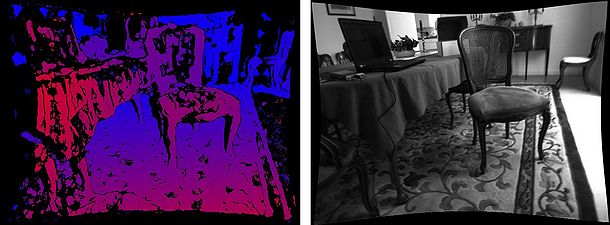Difference between revisions of "Example Stereo Disparity"
m |
m |
||
| Line 19: | Line 19: | ||
* [[Example_Rectification_Calibrated| Rectifying Calibrated Cameras]] | * [[Example_Rectification_Calibrated| Rectifying Calibrated Cameras]] | ||
* [[Example_Stereo_Single_Camera| Stereo from Single Camera Example]] | * [[Example_Stereo_Single_Camera| Stereo from Single Camera Example]] | ||
Related Videos | |||
* [https://www.youtube.com/watch?v=8pn9Ebw90uk&t=672s Stereo Update 2020] | |||
= Example Code = | = Example Code = | ||
Revision as of 20:51, 21 June 2020
Shows how to compute dense disparity between two rectified stereo images. BoofCV provides two different rectangular region based algorithms and noise reduction techniques targeted at real-time processing. Stereo vision can be difficult to get right, so please read all JavaDoc and cited papers. Dense stereo disparity is a computationally expensive and is likely to require a reduction in image size to achieve truly real-time performance.
For visualization purposes the disparity is encoded using a color histogram. Hotter colors indicate closer objects while cooler objects indicate objects that are farther away. Cameras must be accurate calibrated or else an error of a few pixels will drastically degrade performance. A common preprocessing step is to run a Laplacian of Gaussian edge detector across the image to provide invariance to lighting conditions. This was not done below because the cameras have their gain synchronized.
Example File: ExampleStereoDisparity.java
Concepts:
- Stereo Vision
- Disparity
- Rectification
Related Examples:
Related Videos
Example Code
/**
* The disparity between two stereo images is used to estimate the range of objects inside
* the camera's view. Disparity is the difference in position between the viewed location
* of a point in the left and right stereo images. Because input images are rectified,
* corresponding points can be found by only searching along image rows.
*
* Values in the disparity image specify how different the two images are. A value of X indicates
* that the corresponding point in the right image from the left is at "x' = x - X - minDisparity",
* where x' and x are the locations in the right and left images respectively. An invalid value
* with no correspondence is set to a value more than (max - min) disparity.
*
* @author Peter Abeles
*/
public class ExampleStereoDisparity {
/**
* Computes the dense disparity between between two stereo images. The input images
* must be rectified with lens distortion removed to work! Floating point images
* are also supported.
*
* @param rectLeft Rectified left camera image
* @param rectRight Rectified right camera image
* @param regionSize Radius of region being matched
* @param minDisparity Minimum disparity that is considered
* @param rangeDisparity Number of disparity values considered.
* @return Disparity image
*/
public static GrayU8 denseDisparity(GrayU8 rectLeft , GrayU8 rectRight ,
int regionSize,
int minDisparity , int rangeDisparity )
{
// A slower but more accuracy algorithm is selected
// All of these parameters should be turned
ConfigDisparityBMBest5 config = new ConfigDisparityBMBest5();
config.errorType = DisparityError.CENSUS;
config.disparityMin = minDisparity;
config.disparityRange = rangeDisparity;
config.subpixel = false;
config.regionRadiusX = config.regionRadiusY = regionSize;
config.maxPerPixelError = 35;
config.validateRtoL = 1;
config.texture = 0.2;
StereoDisparity<GrayU8, GrayU8> disparityAlg =
FactoryStereoDisparity.blockMatchBest5(config, GrayU8.class, GrayU8.class);
// process and return the results
disparityAlg.process(rectLeft,rectRight);
return disparityAlg.getDisparity();
}
/**
* Same as above, but compute disparity to within sub-pixel accuracy. The difference between the
* two is more apparent when a 3D point cloud is computed.
*/
public static GrayF32 denseDisparitySubpixel(GrayU8 rectLeft , GrayU8 rectRight ,
int regionSize ,
int minDisparity , int rangeDisparity )
{
// A slower but more accuracy algorithm is selected
// All of these parameters should be turned
ConfigDisparityBMBest5 config = new ConfigDisparityBMBest5();
config.errorType = DisparityError.CENSUS;
config.disparityMin = minDisparity;
config.disparityRange = rangeDisparity;
config.subpixel = true;
config.regionRadiusX = config.regionRadiusY = regionSize;
config.maxPerPixelError = 35;
config.validateRtoL = 1;
config.texture = 0.2;
StereoDisparity<GrayU8, GrayF32> disparityAlg =
FactoryStereoDisparity.blockMatchBest5(config, GrayU8.class, GrayF32.class);
// process and return the results
disparityAlg.process(rectLeft,rectRight);
return disparityAlg.getDisparity();
}
/**
* Rectified the input images using known calibration.
*/
public static RectifyCalibrated rectify(GrayU8 origLeft , GrayU8 origRight ,
StereoParameters param ,
GrayU8 rectLeft , GrayU8 rectRight )
{
// Compute rectification
RectifyCalibrated rectifyAlg = RectifyImageOps.createCalibrated();
Se3_F64 leftToRight = param.getRightToLeft().invert(null);
// original camera calibration matrices
DMatrixRMaj K1 = PerspectiveOps.pinholeToMatrix(param.getLeft(), (DMatrixRMaj)null);
DMatrixRMaj K2 = PerspectiveOps.pinholeToMatrix(param.getRight(), (DMatrixRMaj)null);
rectifyAlg.process(K1,new Se3_F64(),K2,leftToRight);
// rectification matrix for each image
DMatrixRMaj rect1 = rectifyAlg.getRect1();
DMatrixRMaj rect2 = rectifyAlg.getRect2();
// New calibration matrix,
DMatrixRMaj rectK = rectifyAlg.getCalibrationMatrix();
// Adjust the rectification to make the view area more useful
RectifyImageOps.allInsideLeft(param.left, rect1, rect2, rectK, null);
// undistorted and rectify images
FMatrixRMaj rect1_F32 = new FMatrixRMaj(3,3);
FMatrixRMaj rect2_F32 = new FMatrixRMaj(3,3);
ConvertMatrixData.convert(rect1, rect1_F32);
ConvertMatrixData.convert(rect2, rect2_F32);
ImageDistort<GrayU8,GrayU8> imageDistortLeft =
RectifyImageOps.rectifyImage(param.getLeft(), rect1_F32, BorderType.SKIP, origLeft.getImageType());
ImageDistort<GrayU8,GrayU8> imageDistortRight =
RectifyImageOps.rectifyImage(param.getRight(), rect2_F32, BorderType.SKIP, origRight.getImageType());
imageDistortLeft.apply(origLeft, rectLeft);
imageDistortRight.apply(origRight, rectRight);
return rectifyAlg;
}
public static void main( String args[] ) {
String calibDir = UtilIO.pathExample("calibration/stereo/Bumblebee2_Chess/");
String imageDir = UtilIO.pathExample("stereo/");
StereoParameters param = CalibrationIO.load(new File(calibDir , "stereo.yaml"));
// load and convert images into a BoofCV format
BufferedImage origLeft = UtilImageIO.loadImage(imageDir , "chair01_left.jpg");
BufferedImage origRight = UtilImageIO.loadImage(imageDir , "chair01_right.jpg");
GrayU8 distLeft = ConvertBufferedImage.convertFrom(origLeft,(GrayU8)null);
GrayU8 distRight = ConvertBufferedImage.convertFrom(origRight,(GrayU8)null);
// rectify images
GrayU8 rectLeft = distLeft.createSameShape();
GrayU8 rectRight = distRight.createSameShape();
rectify(distLeft,distRight,param,rectLeft,rectRight);
// compute disparity
GrayU8 disparity = denseDisparity(rectLeft,rectRight,5,10,60);
// GrayF32 disparity = denseDisparitySubpixel(rectLeft,rectRight,5,10,60);
// show results
BufferedImage visualized = VisualizeImageData.disparity(disparity, null,60,0);
ListDisplayPanel gui = new ListDisplayPanel();
gui.addImage(rectLeft, "Rectified");
gui.addImage(visualized, "Disparity");
ShowImages.showWindow(gui,"Stereo Disparity", true);
}
}
